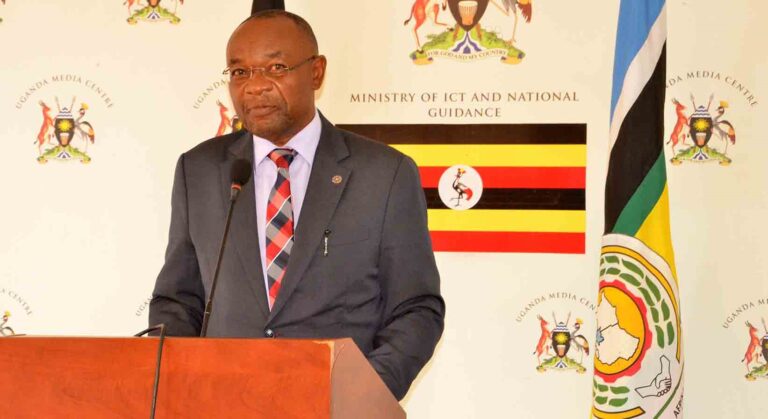
Ramathan Ggoobi, the Permanent Secretary in the Ministry of Finance, Planning, and Economic Development, addressing the media recently on the headcount of civil servants
The Office of the Auditor General has recently completed a headcount of civil servants in various government ministries, departments, and agencies, with the aim of creating a new payroll system to address financial losses. The headcount covered a wide range of government employees, including those in local government, health centers, universities, secondary and primary schools, statutory authorities, and government-owned corporations.
Speaking on condition of anonymity, an official from the Office of the Auditor General stated that the headcount process is nearly finished, having covered both urban and rural areas. The officials have only counted and verified individuals who physically presented themselves during the headcount. This initiative is expected to help establish a comprehensive and accurate record of civil service employees.
Ramathan Ggoobi, the Permanent Secretary in the Ministry of Finance, Planning, and Economic Development, explained that the headcount will determine who is legitimately employed in the civil service. Ggoobi noted that some complaints regarding nonpayment or delayed salaries have arisen from individuals who were irregularly recruited and do not appear on the government payroll. In the upcoming financial year 2023/24, only verified staff members will receive their monthly salaries, and matters concerning wages, pensions, and gratuity will be planned solely for individuals on the verified list.
Secretary to the Treasury, Ggoobi, emphasized that one of the main reasons for the inflated government payroll, resulting in significant monthly losses, is the payment of non-existent workers. He specifically blamed Chief Accounting Officers (CAOs) for illegally recruiting individuals and falsely promising to add them to the payroll without actually doing so.
The Annual Report of the Auditor General to Parliament for the Financial Year ended June 30, 2022, highlighted irregular and unclear payments as factors contributing to the government’s budgetary shortfalls. The report also revealed that 4,341 newly recruited and transferred employees experienced delays of up to 12 months in accessing the payroll, resulting in 1,746 staff members not being paid a total of sh2.8b by the end of the financial year. Accounting officers faced challenges integrating staff into the personnel and payroll system, citing recruitment outside the approved structure as a reason for the delay.
Additionally, the Auditor General’s report raised concerns about the payment of salaries to “salaried ghosts.” An amount of sh1b was disbursed to 795 staff members who had either been transferred, absconded, or passed away, covering a period of 16 months. Despite the Uganda Public Standing Orders, 2021, which stipulate that salary payments should cease immediately when an officer stops rendering services to the government, it often takes months for these payments to be stopped. Delays in removing staff from the payroll led to financial losses, with accounting officers attributing the difficulties to the absence of validation before decentralization of the payroll.
The issue of pensioners also surfaced, highlighting the lack of proper documentation for claimants. The Auditor General revealed that over 1,000 pensioners had not received their entitled payments, amounting to approximately sh1.3b. This situation has resulted in the accumulation of pension arrears, with 1,019 new pensioners in 65 local governments experiencing delays of 50 to 110 months in accessing the pension payroll.
Gloria Namugera Nakibuuka, the Communications Manager in the Office of the Auditor General, pointed out various anomalies in the payroll system, including under-remittance, inaccurate computation of pensions and gratuities, and non-deduction and under-deduction of Pay As You Earn (PAYE). Previous issues plaguing the government payroll have included ghost workers, delayed removal of deceased individuals, payments to ineligible recipients, delayed




